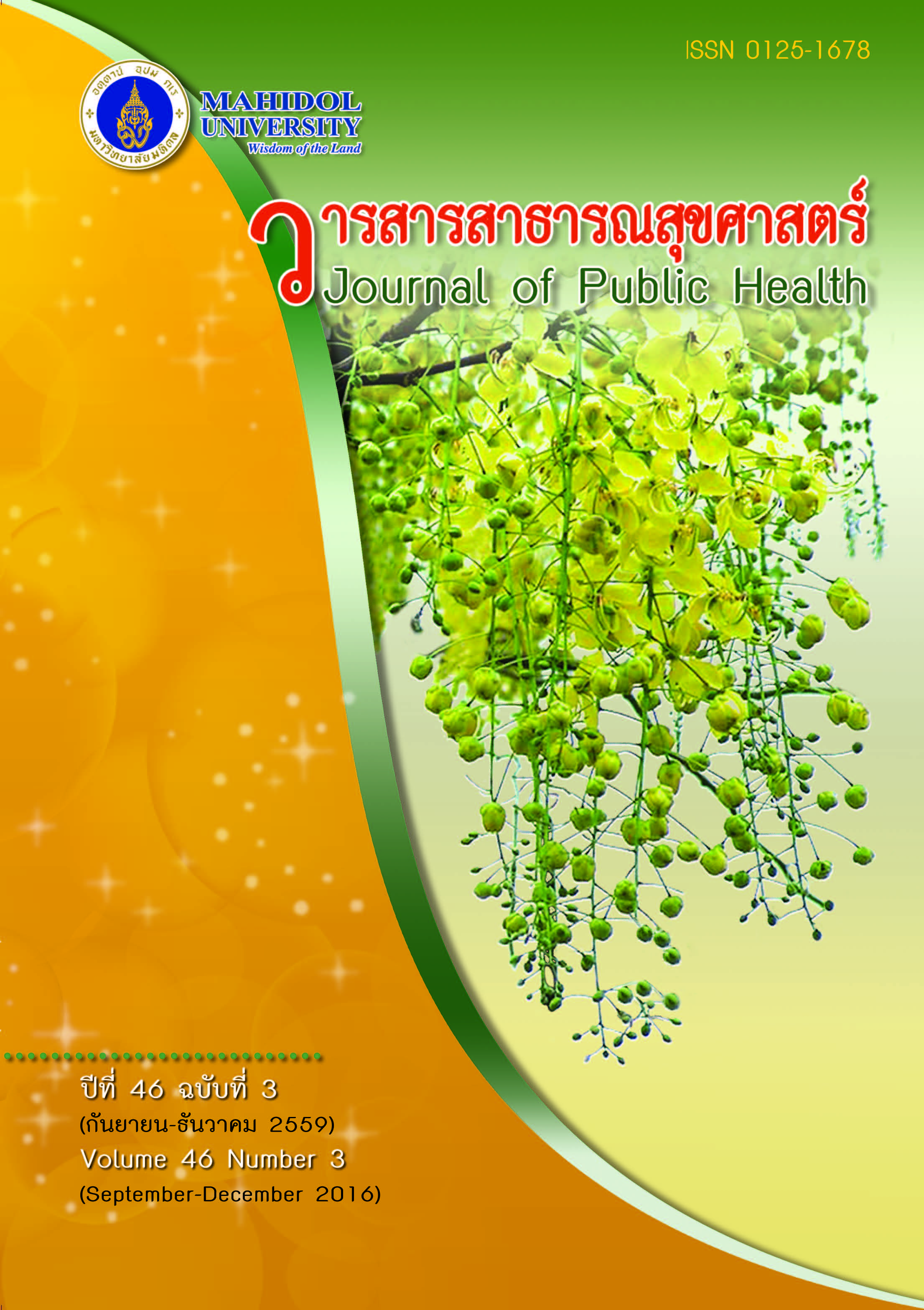Community Partnership, Context-basedIntervention andDiabetes Control in Thailand
Keywords:
Community partnership, context-based intervention, DM control, การมีส่วนร่วมของชุมชน, บริบทชุมชน, การควบคุมเบาหวานAbstract
This study aimed to explore DMsituation,solutions,andeffecting action plans for DM controlin Ang Thong, one of the top five provinces for DM prevalence in Thailand.The study was a qualitative study applying Appreciation Influence Control (AIC) as a technique to build participation among five communities. Community partnerships in each community comprised4groups: 1) people with DM, people at risk for DM and their family members, 2) health care volunteers, 3) local health care officers and 4) community leaders. Each group comprised 8 participants recruited for group discussion and brainstorming.Content analysis was applied as a method for data analysis from 25 group discussions. The findings showed that diabetes is difficult to control because of nonadherence in treatment, undercontrolled blood sugar levels, limited awareness, lack of exercise, and poor knowledge about DM. The analysis also revealed the influence of cultural norms, especially, consuming food with high sugar and cholesterol content during traditional holidays among community partners. Moreover, the beliefs in karma and attitudes toward illness impede the successful rate for diabetes screening among at risk groups in communities. The community partners at the end of the study proposed 5 context based interventions to combat DM in their own context.These projects include: herb club against DM, local wisdom for DM prevention, yoga against DM, Thai ascetic yoga for health and sunchoke (Jerusalem artichoke) for DM control. The study proposed DM control strategies that give special consideration to culturally and contextually appropriate interventions.
การมีส่วนร่วม บริบทของชุมชน และการควบคุมเบาหวานในไทย
การศึกษานี้มีวัตถุประสงค์เพื่อศึกษาสถานการณ์ การแก้ปัญหา และการควบคุมเบาหวานที่มีประสิทธิภาพในอ่างทองซึ่งเป็นจังหวัดหนึ่งในห้าที่มีอัตราป่วยด้วยโรคเบาหวานสูงสุด โดยประยุกต์ใช้กระบวนการAppreciation Influence Control (AIC)ในการสร้างการมีส่วนร่วมของชุมชน 5ชุมชน ซึ่งในแต่ละชุมชนประกอบด้วย 1 กลุ่มผู้ป่วยเและกลุ่มเสี่ยงต่อการเกิดโรคเบาหวานรวมทั้งสมาชิกในครอบครัว 2กลุ่มอาสาสมัครสาธารณสุข 3กลุ่มเจ้าหน้าที่สุขภาพ และ4 กลุ่มผู้นำชุมชน ใช้การวิเคราะห์ข้อมูลเชิงเนื้อหาจากการสนทนากลุ่มและการระดมสมอง 25 กลุ่มกลุ่มละ 8 คน ผลการศึกษาพบว่าโรคเบาหวานยากต่อการควบคุมเนื่องจากการรักษาไม่ต่อเนื่อง ความไม่สามารถในการควบคุมระดับน้ำตาลในเลือด การขาดความตระหนักในภาวะโรค การขาดการออกกำลังกายและการขาดความรู้เรื่องโรควัฒนธรรมการรับประทานอาหารที่มีรสหวานและมีคอเลสเตอรอลสูงในช่วงเทศกาลของชุมชนความเชื่อในเรื่องกฎแห่งกรรมและทัศนคติต่อความเจ็บป่วยของคนในชุมชนเป็นอุปสรรคต่อการคัดกรองกลุ่มเสี่ยงโดยเครือข่ายชุมชนได้เสนอ โครงการพืชสมุนไพรต้านเบาหวาน โครงการภูมิปัญญาท้องถิ่นเพื่อป้องกันเบาหวาน โครงการโยคะละเบาหวาน โครงการฤาษีดันตนและแก่นตะวัน เพื่อการควบคุมเบาหวานที่ให้ความสำคัญกับความเหมาะสมทางวัฒนธรรมและบริบทของชุมชน
Downloads
Published
Issue
Section
License
Creative Commons License CC-BY-ND


